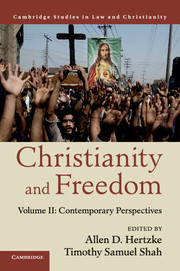Book contents
- Frontmatter
- Colophon
- Contents
- Contributing Authors
- Acknowledgments
- Introduction: Christianity and Freedom in the Contemporary World
- 1 Persecution in the Context of Religious and Christian Demography, 1970–2020
- 2 Patterns and Purposes of Contemporary Anti-Christian Persecution
- 3 Where the Spirit Leads: Global Pentecostalism and Freedom
- 4 Christianity among the Marginalized: Empowering Poor Women in India
- 5 Transnational Christian Networks for Human Dignity
- 6 The Growth and Dynamism of Chinese Christianity
- 7 Christianity and Religious Freedom in Indonesia since 1998
- 8 Christianity and Freedom in India: Colonialism, Communalism, Caste, and Violence
- 9 Vietnam: Christianity's Contributions to Freedoms and Human Flourishing in Adversity
- 10 The Challenge and Leaven of Christianity in Pakistan
- 11 Christianity and the Challenge of Religious Violence in Northern Nigeria
- 12 Copts of Egypt: Defi ance, Compliance, and Continuity
- 13 Between the Hammer and the Anvil: Indigenous Palestinian Christianity in the West Bank
- 14 Christians in the State of Israel: Between Integration and Emigration
- 15 Arab Muslim Attitudes toward Religious Minorities
- 16 They That Remain: Syrian and Iraqi Christian Communities amid the Syria Confl ict and the Rise of the Islamic State
- Index
16 - They That Remain: Syrian and Iraqi Christian Communities amid the Syria Confl ict and the Rise of the Islamic State
Published online by Cambridge University Press: 05 February 2016
- Frontmatter
- Colophon
- Contents
- Contributing Authors
- Acknowledgments
- Introduction: Christianity and Freedom in the Contemporary World
- 1 Persecution in the Context of Religious and Christian Demography, 1970–2020
- 2 Patterns and Purposes of Contemporary Anti-Christian Persecution
- 3 Where the Spirit Leads: Global Pentecostalism and Freedom
- 4 Christianity among the Marginalized: Empowering Poor Women in India
- 5 Transnational Christian Networks for Human Dignity
- 6 The Growth and Dynamism of Chinese Christianity
- 7 Christianity and Religious Freedom in Indonesia since 1998
- 8 Christianity and Freedom in India: Colonialism, Communalism, Caste, and Violence
- 9 Vietnam: Christianity's Contributions to Freedoms and Human Flourishing in Adversity
- 10 The Challenge and Leaven of Christianity in Pakistan
- 11 Christianity and the Challenge of Religious Violence in Northern Nigeria
- 12 Copts of Egypt: Defi ance, Compliance, and Continuity
- 13 Between the Hammer and the Anvil: Indigenous Palestinian Christianity in the West Bank
- 14 Christians in the State of Israel: Between Integration and Emigration
- 15 Arab Muslim Attitudes toward Religious Minorities
- 16 They That Remain: Syrian and Iraqi Christian Communities amid the Syria Confl ict and the Rise of the Islamic State
- Index
Summary
The past decade has inaugurated a devastating new reality for the Christian minorities of Iraq and Syria. The survival of these vulnerable communities has been jeopardized by a deadly triad composed of the security vacuum resulting from the U.S.-led War in Iraq, Islamist violence, and the consequences of despotic power. This chapter presents the current status of Christian communities in Iraq and Syria, providing brief historical background and then focusing on the seismic events that transpired from 2011 through 2014.
Christian communities in these two countries identify according to a number of ethnic labels, such as Assyrian, Chaldean, Armenian, Arab, Syriac, and even Kurdish. Christians are further distributed among various Orthodox, Catholic, and Protestant denominational affiliations, some of which correspond exclusively to ethnicity. To speak of “Christians” broadly across both Syria and Iraq necessarily means reducing an expansive diversity to an oversimplified generality; however, for the purpose of this chapter, which is to consider the overall welfare of Christian communities in these two countries, it will be possible to speak of certain trends about which nearly all Christian communities have shared concerns.
This chapter consists of seven sections. First, historical context is provided in separate sections for Iraqi and Syrian Christian communities. In the third section, the experience of Christians in the current Syria conflict is presented, before moving to the origins of the Islamic State jihadist organization in the fourth section. The fifth section describes the situation for Christians under Islamic state control in Syria and Iraq and narrates the expulsion of Mosul's Christian population. The sixth section investigates why Christians in Mosul did not perceive jizya as a viable option, followed by a conclusion that considers political questions and trends of militarization.
THE CONTEXT FOR IRAQI CHRISTIANS: MORE THAN A CENTURY OF INSECURITY
The Armenians of Anatolia were not the only Christians who suffered during the final days of the Ottomans. The transition from empire to nation-state was also calamitous for Assyrian Christians, who, along with the Armenians, had been convinced by the Allies to fight against the Turks during World War I. Ottoman forces responded with such widespread massacres of Christian civilians that the word “genocide” was coined to describe the massive slaughter that began in 1915. Survivors were expelled and many Armenians settled in Arab countries.
- Type
- Chapter
- Information
- Christianity and Freedom , pp. 453 - 488Publisher: Cambridge University PressPrint publication year: 2016
- 1
- Cited by



